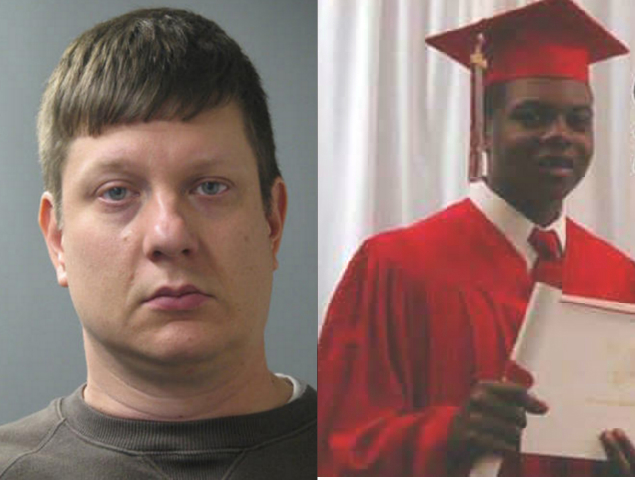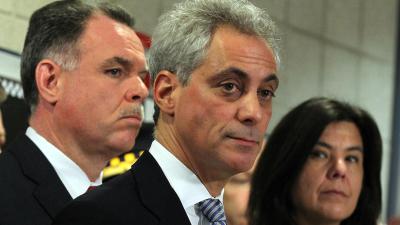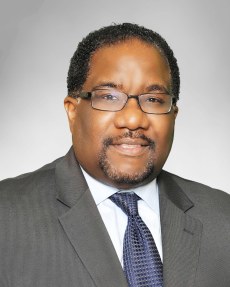This sermon was preached for daily worship at the Lutheran School of Theology at Chicago (LSTC) in Augustana Chapel. To hear the audio file of this sermon being preached, click here.
Texts: Isa. 10:12-20 + Psalm 119:169-176 + John 7:25-36
The trial of Jason Van Dyke, the police officer who shot and killed Laquan McDonald four years ago here in Chicago, began this week. For those of us who have lived here in Chicago for some time, or who have been following the story of endemic police violence against black and brown bodies nationally, the details of this case are very old news. But for those here today who may be new to this country, or perhaps just awakening to this issue, the details in brief are these:
Laquan McDonald was born on September 25, 1997. If he were still alive, he would be celebrating his 21st birthday next week. But he is not alive because, on the night of October 20, 2014 he was fatally shot by Chicago police officer Jason Van Dyke. Police had been called to investigate reports of a person breaking into vehicles at a trucking yard at 41st Street and Kildare, which is about 11 miles from here. You could get there in 20 minutes by car, just off the Stevenson Expressway, north of Midway Airport.

When officers confronted Laquan, he used a knife with a 3-inch blade to slice the tire of a patrol car and damage the windshield. Initial reports by the police department said that he lunged at Officer Jason Van Dyke, forcing him to shoot Laquan in self-defense. This was the accepted story for almost a year, until video taken by a police car dashboard camera was released, clearly showing that 17 year-old Laquan was walking away from the police officers when he was shot, 16 times in 15 seconds.

The tale of how that dashboard video got released is a story all its own, and it’s a story worth taking the time to learn. It involves a $5 million payout to Laquan’s family that wasn’t settled until the day after Mayor Rahm Emanuel secured re-election to his second term, and continued protests that built into a movement calling for the resignation of the city’s top officials. Eventually police superintendent Garry McCarthy was fired, and Cook County’s State’s Attorney Anita Alvarez lost her bid for re-election. There is even speculation that Mayor Rahm Emanuel’s decision not to seek a third term is connected to the timing of this trial coming just as Chicago’s mayoral race is heating up.
Chicago Public Radio has created a podcast titled 16 Shots that goes deep into the facts surrounding Laquan’s death, and explores how the police killing of this one young man set off a series of events that led to the United States Department of Justice conducting a civil rights investigation that resulted in a public report in which the Chicago Police Department was described as having a culture of “excessive violence,” a “culture in which officers expect to use force and never be carefully scrutinized about the propriety of that use,” especially when used against minorities, an assessment supported by the fact that Chicago Police are 14 times more likely to use force against young black men than against their white counterparts.
But I worry that I’m getting off track here, because I’m supposed to be talking about Jesus.

Right, so I was listening to the podcast, 16 Shots, and was struck by the fact that of all the places the journalists might have chosen to begin their reporting on this story, they began with a clip of an interview with the Rev. Marshall Hatch, Sr., pastor of New Mt. Pilgrim Missionary Baptist Church, who — along with other black clergy from Chicago’s south and west sides — was called into the mayor’s office and asked for support in quelling the rising tensions immediately after the video footage of Laquan’s killing was released. These clergy were told in no uncertain terms that if they did not help out, they should not expect support from city hall when they came with requests of their own. In that same meeting, Pastor Hatch learned that Laquan had been raised in foster care from the age of three, bounced from home to home, diagnosed with learning disabilities and post-traumatic stress disorder rooted in the brutality and trauma of growing up on the streets. Reflecting theologically on these facts, Pastor Hatch told the reporter,
“That’s when I knew we had moved into a real spiritual realm with this piece … and as a pastor, to me, that’s divine poetry. ‘Cuz he’s a throwaway person if ever there was one. That would have to be the one that God would have to put in the center, the name that somebody else thinks is worth throwing away. And it was pretty explosive after that, as the ministers kind of said, ‘Look, we’re not making any guarantees. It’s not our job to go and tamp down a situation that you guys have created.’”
That would have to be the one that God would have to put in the center, the name that somebody else thinks is worth throwing away.
Are we talking about Jesus yet?
This past Sunday, the Church throughout the world gathered for worship and many heard the excerpt from the eighth chapter of Mark’s gospel, in which Jesus asks the disciples, “Who do people say that I am?” and follows this up with, “But who do you say that I am?” Peter answers him, “You are the Messiah.”
The daily lectionary selects passages that support our reflection on the meaning of the Sunday texts, setting them in conversation with other biblical voices so that we can more readily perceive the conversation that’s going on within scripture about questions like these. So, today we hear a related conversation taking place in the gospel of John, as “some of the people of Jerusalem” speculate about Jesus’ identity, wondering with one another whether or not the authorities have actually determined that Jesus is, in fact, the messiah.
This passage is the only time where “the people of Jerusalem” appear as a group in John’s gospel. They seem to be different from “the crowds” that Jesus has been addressing, who may be pilgrims to Jerusalem, there for the Festival of Booths. Because, in the verses immediately preceding this passage, Jesus says to the crowd, “Did not Moses give you the law? Yet none of you keeps the law. Why are you looking for an opportunity to kill me?” And the crowd replies, “You have a demon! Who is trying to kill you?” Jesus perceives correctly that his movement is setting him in opposition to the reigning power structures, and that he is a man marked for death. The crowds, less schooled in the politics of Jerusalem, doubt Jesus. “The people of Jerusalem,” however, know how power works in Jerusalem. They understood how the religious authorities operated when it came to exposing false messiahs, so they knew that Jesus’ life was most definitely at risk.
They say, “Isn’t this the one they want to kill?” because they know that’s how the system works, to eliminate all voices of dissent. “And here he is, speaking freely, and they have nothing to say to him! Can it be true that the authorities have made up their minds that this is the Messiah?”
So here we have finally returned to the question from Mark’s gospel, the question that ties these readings together this week, the question that Jesus puts to his disciples, and to us, “Who do you say that I am?” It is a question that forces us to examine our expectations of God, who God is and how God moves in time and space. Is God a divine conqueror, the sovereign of a heavenly empire? Is God an ineffable wisdom, the truest of realities hiding in plain sight? Is God a righteous avenger, upending worlds and effecting regime change? Who is God, and how does God show up in the world?
We all have our explicit and implicit expectations about who God is, and how God will show up in our worlds. The people of Jerusalem say, “Yet we all know where this fellow comes from, but when the Messiah comes, no one will know that one’s origins.”
The story begins working in irony at this point, because the people of Jerusalem have named their expectation for God’s messiah, that that one will have unknown origins. Jesus cannot be the messiah, because they know exactly where he is from, Nazareth in Galilee, not Bethlehem — at least, not in John’s gospel — the expected site for a messiah in the Davidic model of warrior kings. The irony is that Jesus actually does meet their expectations, his origins are unknown to them, because he has been sent by “the One who is true.” He is, to use John’s earlier words, “the Word, and the Word was with God, and the Word was God. [The Word] was in the beginning with God. All things came into being through [the Word], and without [the Word] not one thing came into being. What has come into being in [the Word] was life, and the life was the light of all people.” (John 1:1-4)
So here is John’s answer to the conversation Jesus started in Mark. “Who do you say that I am, John?” And John replies, “You are the Word. You are the life that is the light of all people. The light that shines in the darkness, that has not been overcome. You are the Word that became flesh and lived among us.”
This is why the people of Jerusalem cannot recognize Jesus as the messiah at first, because they cannot conceive that God would take on human flesh in time and space, in history and in politics, in the dying mess of human relations and the decay of human bodies. In children shot down in the street and hung from crosses.
That would have to be the one that God would have to put in the center, the name that somebody else thinks is worth throwing away.
“But to all who received him, who believed in his name, he gave power to become children of God, who were born, not of blood or of the will of the flesh or of the will of humanity, but of God.” (John 1:12-13)
In this way, John’s gospel responds to Mark, asking a new question of those looking for a messiah. John poses from the very first chapter, “And who do you say that you are? Who do you think you are? Could you be children of God? Could we all be children of God?”
This is the question we grapple with. Our desire to deny that name, child of God, to those we hate, those who oppress us. Our habit of denying that name to ourselves, in our own self-hatred and self-doubt. The evidence of history, the way that all our hate of self and other has laid the foundation for systems of violence that seem eternal. Yet, the gospel truth is that the Word of God, shining in darkness, has not been overcome and, one day, it shall be that same Word that overcomes.
That is who we say Jesus is: the Word, co-eternal with God, the Word that creates, the Word that overcomes. The Word that somebody else thinks is worth throwing away. That is the truth we bear in our hearts and on our lips, even in moments when it seems that truth and justice themselves are on trial.
One thought on “Sermon: Wednesday, September 19, 2018”